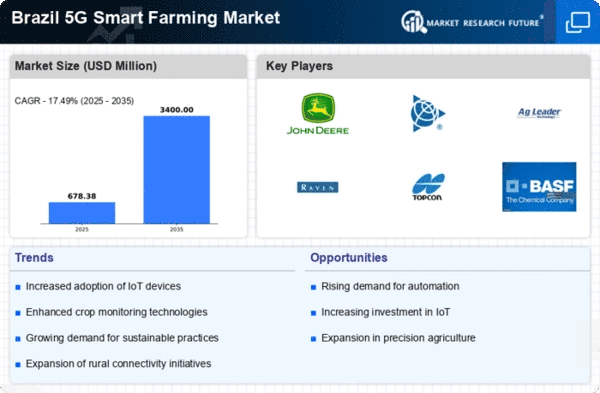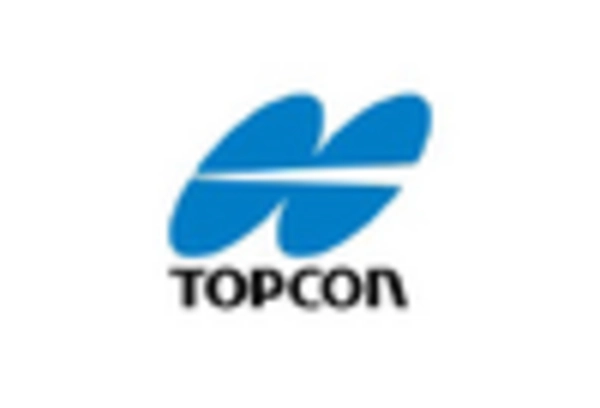Rising Demand for Food Security
The rising demand for food security is a pivotal driver for the 5g smart-farming market in Brazil. As the population continues to grow, the pressure on agricultural systems to produce more food sustainably intensifies. 5G technology offers solutions that can enhance productivity and reduce waste, addressing these challenges. For instance, precision farming techniques enabled by 5G can optimize water usage and fertilizer application, potentially reducing costs by up to 20%. This focus on efficiency aligns with Brazil's goals of increasing food production while minimizing environmental impact. Thus, the 5g smart-farming market is positioned to thrive in response to these pressing food security concerns.
Enhanced Crop Monitoring Solutions
The 5g smart-farming market in Brazil is driven by the need for enhanced crop monitoring solutions. With the integration of 5G technology, farmers can utilize real-time data analytics to monitor crop health, soil conditions, and weather patterns. This capability allows for timely interventions, potentially increasing yields by up to 30%. The ability to deploy sensors across vast agricultural lands enables farmers to make informed decisions, optimizing resource allocation. Furthermore, the Brazilian government has been promoting digital agriculture initiatives, which may further stimulate the adoption of these technologies. As a result, the demand for advanced monitoring solutions is likely to grow, positioning Brazil as a leader in the 5g smart-farming market.
Adoption of IoT Devices in Agriculture
The adoption of Internet of Things (IoT) devices is significantly influencing the 5g smart-farming market in Brazil. Farmers are increasingly utilizing IoT sensors and devices to collect data on various agricultural parameters, such as soil moisture and crop health. The integration of 5G technology enhances the capabilities of these devices, allowing for faster data transmission and real-time analytics. This trend is likely to improve decision-making processes, leading to better crop management and resource efficiency. As the agricultural sector in Brazil embraces IoT solutions, the 5g smart-farming market is expected to expand, driven by the need for smarter farming practices.
Government Support for Digital Agriculture
Government support plays a crucial role in the growth of the 5g smart-farming market in Brazil. Initiatives aimed at promoting digital agriculture are being implemented, with funding programs designed to assist farmers in adopting new technologies. The Brazilian Ministry of Agriculture has allocated significant resources to enhance connectivity in rural areas, which is essential for the effective implementation of 5G solutions. This support may lead to increased adoption rates among farmers, as they gain access to the necessary infrastructure and training. Consequently, the 5g smart-farming market is likely to benefit from these government initiatives, fostering a more technologically advanced agricultural sector.
Increased Investment in Agricultural Technology
Investment in agricultural technology is a significant driver for the 5g smart-farming market in Brazil. The country has seen a surge in funding for agri-tech startups, with investments reaching approximately $200 million in recent years. This influx of capital is likely to accelerate the development and deployment of 5G-enabled farming solutions. Investors are increasingly recognizing the potential of 5G to enhance productivity and efficiency in agriculture. As Brazilian farmers seek to modernize their operations, the availability of innovative technologies, such as autonomous tractors and drones, is expected to expand. This trend suggests a robust growth trajectory for the 5g smart-farming market, as technology adoption becomes more widespread.
















